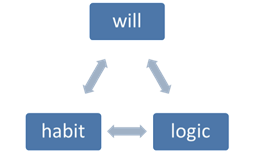How is willpower crucial to our success?
The will is a faculty by which human beings can transcend their own limits in order to achieve a goal. For some, the act of quitting is pre-determined; for others, it is an exception that must quickly be replaced by working on oneself and one’s environment. In this regard, the most powerful people in the world right now — Elon Musk, Larry Page, Jack Dorsey, Jeff Bezos, Mark Zuckerberg — all share this will that defines their action.
Indeed, the goal of all living beings is to strive for action, a psychological and physical phenomenon that, in reality, is founded on and nourished by willpower. In this way, willpower is different from desire, which most often serves to ignite will. Rather ineptly, it is common for us to say “I want” when we mean “I desire.” This confusion between will and desire is easily explained, as desire and will are both internal impulses that impel us to act. Moreover, desire and will often coincide, but there are major differences between these two impulses that lead us to act.
A quote from Spinoza’s Ethics demonstrates that the impulse created by desire is emotional, while the one that stimulates will is active: “[All men] have the desire to seek for what is useful to them, and they are conscious of such desire. [...] It follows, first, that men think themselves free inasmuch as they are conscious of their volitions and desires.” This means that the person who experiences desire does not sufficiently question it. This lack of insight into one’s emotions and the object of desire indicates confusion. It is also due to distraction and restlessness which seek out only pleasure. This mindset prevents us from seeing our fundamental motivation from which we could derive a structure and set of rules. As such, will differs from desire in its organisation, for it is based on reason. It represents critical consciousness and synthesis, whereas desire is impulsive and explosive.
In addition, this decisive and voluntary action gravitates towards what is difficult and painful as well as pleasant. Reason must intervene in order for will to function fully and efficiently. To exercise one’s will involves, above all, reflection, judgment, reason, and deliberation. Will engages our entire personality and rebuilds its structures from within, which requires time and perseverance. As a result, in order to achieve our life goals, we must subordinate our desires to our will. When we apply reason to our goals, we get reaction, action, and success.
Yet, in order for will to persist, it must be supported by the habit of repetition, which will gradually imbed it in our minds. To this end, it is necessary, even critical, to review our plans regularly and make sure they are relevant to our daily and future lives.
In order to do this, whenever I have a free moment, I open SDoky and reread my previously entered action plans. If I notice that I’ve begun to depart from my plans, I invoke my newly embraced principle of will.
It is therefore essential to constantly repeat (habit) and question (logic) the impulses that lead us to action (will), as illustrated in the following diagram:

The balance between habit, logic and will is necessary to prevent repetition from developing without establishing a symbiosis with intelligence and action. Indeed, if you do not factor in coherence and cohesion, the habit will become a routine (bad habit) that devalues your project or goal and interrupts the evolution of will into success.
